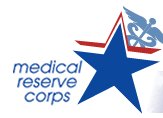
|

|
|
|
 Home > Priorities for Public HealthThe U.S. Surgeon General has outlined priorities for the health of individuals and the nation as a whole. The overarching goal is to improve health literacy, and in support of this, work towards increasing disease prevention, eliminating health disparities, and improving public health preparedness. These priorities provide Medical Reserve Corps (MRC) units with specific areas to target that will strengthen the public health infrastructure within their local communities. Improving health literacy is important so that all Americans may access, understand and use health-related information and services to make good health decisions. To address the more than 90 million Americans that do not understand basic health information, MRC units can work with the Surgeon General to increase awareness within their communities about the importance of health literacy and the challenges presented when there is a lack of knowledge concerning health issues. Educating the public on how to prevent diseases is also strongly encouraged. With 7 of 10 Americans dying each year of a preventable chronic disease, it is imperative that we address such problems as obesity, HIV/AIDS, tobacco use, birth defects, injury, and low physical activity. By holding activities such as diabetes detection screenings and exercise programs and by participating in government initiatives such as Steps to a HealthierUS, MRC units can promote this priority in their community and thus decrease the number of people dying of preventable illnesses each year. The goal of eliminating health disparities is to rid minority communities of the greater burden of death and disease from illnesses such as breast cancer, prostate cancer, cervical cancer, cardiovascular disease, and others. All Americans—regardless of their race, heritage, or gender—should have access to good health information, insurance, and services. In support of this priority, MRC units can increase public awareness through programs such as Take a Loved One to the Doctor Day. Additionally, MRC units may wish to target areas within their jurisdiction which may traditionally be underserved, by supporting efforts such as health fairs, blood pressure screenings, and flu shot clinics. Public health preparedness is of great concern because Americans count on a strong public health system capable of meeting any emergency, be it manmade, a weather-related natural disaster, or an emerging infectious illness. MRC volunteers are an important resource in our public health system, and developing partnerships between the MRC and law enforcement, public health, and public safety agencies at all levels of government is an important step in allowing every community to be better able to respond to emergencies. As the MRC works toward partnering with these agencies and preparing for emergencies, they also are bettering the public health infrastructure in their local community. Because the MRC program is based in the Office of the U.S. Surgeon General, it is in a great position to promote these priorities for public health and simultaneously strengthen the health of the nation—one community at a time. To learn more about the public health priorities of the Surgeon General, please visit the Office of the U.S. Surgeon General. Last Updated on 8/29/2006 |





